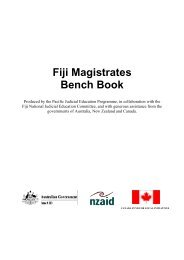Tuvalu Island Courts Bench Book - Federal Court of Australia
Tuvalu Island Courts Bench Book - Federal Court of Australia
Tuvalu Island Courts Bench Book - Federal Court of Australia
You also want an ePaper? Increase the reach of your titles
YUMPU automatically turns print PDFs into web optimized ePapers that Google loves.
The <strong>Court</strong> must not consider whether from any other point <strong>of</strong> view the claim <strong>of</strong> the father is<br />
superior to the mother or whether the claim <strong>of</strong> the mother is superior to that <strong>of</strong> the father in<br />
custody hearings: s3(1)(b) Custody <strong>of</strong> Children Act (Cap 20).<br />
The <strong>Court</strong> may ask for a report to be prepared by the Welfare Officer. The Welfare Officer will<br />
conduct interviews with the parties, parents and extended family. The report will explain the<br />
background and history, and make recommendations for the future <strong>of</strong> the child.<br />
The recommendations made in the Welfare Officer’s report are very important. Those<br />
recommendations can assist the <strong>Court</strong> in order to assess what is in the best interests <strong>of</strong> the child.<br />
See Lokega v Lokega (<strong>Tuvalu</strong> HC 1/95) which emphasises the importance <strong>of</strong> the role <strong>of</strong> the<br />
Welfare Officer.<br />
Also see Faalo Liai v Puatalo Pasama (HC 39/03), which emphasises the importance <strong>of</strong> taking<br />
the time to make a full enquiry and assess the best interests <strong>of</strong> the child.<br />
4.4 Culture and Child Custody<br />
The role <strong>of</strong> culture is highly significant in assessing custody <strong>of</strong> children. The law provides that<br />
any application for child custody is subject to the Native Lands Act (Cap 22).<br />
A particular problem arises where the child is born to parents who are not married. In this case,<br />
if the child has attained a particular age, the child may be ordered to live with the father in<br />
accordance with custom: s3(5) Custody <strong>of</strong> Children Act (Cap 20); s20(2) Native Lands Act (Cap<br />
22). At June 2004 an interpretation <strong>of</strong> s20(2) remains pending with the High <strong>Court</strong> <strong>of</strong> <strong>Tuvalu</strong>.<br />
4.5 How an Application for Child Custody is Made<br />
An application must be made on notice to the <strong>Island</strong> <strong>Court</strong>. This will state:<br />
• who is making the application; and<br />
• the names <strong>of</strong> the parties.<br />
The application may ask for:<br />
• an interim custody order to be made if it is necessary; and<br />
• the <strong>Court</strong> or a Welfare Officer to prepare a report on the circumstances <strong>of</strong> the child, and<br />
give any recommendations.<br />
Every interested party has a right to be served with the application and seek legal advice.<br />
<strong>Tuvalu</strong> <strong>Island</strong> <strong><strong>Court</strong>s</strong> <strong>Bench</strong> <strong>Book</strong> June 2004
















